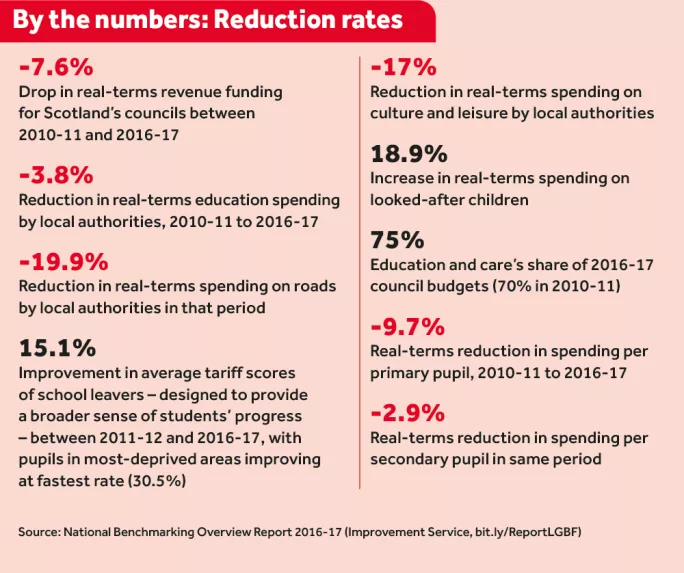Councils have ‘scope to reduce teacher numbers’

A recurring message emerges if you pore over hundreds of pages of local authority budget plans and analysis: the time has come for education to take a greater share of cuts.
Despite recent news that they would receive a Scottish government settlement around £170 million higher than first thought - leading to some cuts being reduced or cancelled - local authorities are warning that education can no longer expect the same protection as in the past.
Tes Scotland analysis of councils’ budget plans - some already agreed, others not ratified at the time of writing - has also found admissions that they may reduce attainment or damage the prospects of poor children.
Reductions in teacher numbers and schools’ devolved budgets are increasingly regarded as a viable means for saving money.
Angus Council last week agreed to save £1.59 million in teacher costs over three years, seeing “scope to reduce teacher numbers”. Perth and Kinross, which was due to set its budget yesterday, proposed saving more than £2 million over three years by shedding a total of nearly 50 primary and secondary teaching jobs.
West Lothian will try to save £6.5 million over five years and shed 146 various education posts - including some teachers - through a review of devolved school management, although it says that there will actually be a net rise in school staff to cope with increasing school rolls.

Councils are increasingly passing on responsibilities and costs to schools, justifying such moves by alluding to the government’s controversial Headteachers’ Charter and its intention to devolve power to schools. West Lothian, for example, states that involving headteachers more in arranging placements for pupils starting at schools “could impact on the efficiency of placement throughout West Lothian” but is “consistent with the requirement for increased delegation to schools”.
Several councils identify music as a source of extra funds: Perth and Kinross was considering to increase the annual charge per pupil for learning a musical instrument from £245.85 to £817, despite acknowledging that poorer pupils are already less likely to take music lessons.
Some eye-catching savings are for relatively small amounts, but include plans to scrap primary swimming lessons, modern language assistants and schemes to support LGBT pupils and promote financial education and outdoor education.
And there is no immediate sign of the situation improving: a report published this month by local authorities organisation the Improvement Service shows that, even with special protection not afforded to other services, education spending in Scotland fell by 3.8 per cent in real terms from 2010-11 to 2016-17 and that “it is likely that councils face continuing funding reductions for the foreseeable future”.
Education unions, based on early feedback about this month’s budgets, fear that additional support is particularly vulnerable. Mike Corbett, an executive member and former president at NASUWT Scotland teaching union, says it looks likely that such cuts “will be more widely applied” this year.
Education ‘taking a hit’
Dougie Atkinson, professional officer for Voice Scotland, is “pretty sure the squeeze on support staff” will continue and says that one council, Fife, has even taken the rare step of issuing a letter warning that there is a risk of redundancies among school administration staff. He adds: “That is a bit alarming - I would be concerned if that became widespread.”
Joanna Murphy, chair of the National Parent Forum of Scotland, believes “the trend is that education is taking a hit - it’s been shielded these past few years in most local authorities”. Plans around teacher numbers are “particularly worrying, but equally things like cuts to janitors impact on the children”. Murphy adds that increases to charges for school meals and music tuition are also common concerns.
The Improvement Service report finds much to be happy about in Scottish education in recent years, as “the current generation of Scottish school leavers is the best-qualified in our history, with the highest rate of participation in higher education in our history” - although there remain “major inequalities in attainment between the most deprived pupils and others”.
But even with last month’s improved Scottish government settlement, local authorities body Cosla fears such progress will stall. Resources spokeswoman Gail McGregor said this week: “This year’s deal means Scotland’s councils are far from out of the woods - and not cementing this funding into core budgets [in future years] would be an extremely bad result for the delivery of essential services.”
A Scottish government spokesman says: “Local government funding to schools is increasing. We want more decisions on school funding to be in the hands of schools and our education reforms are focused on giving schools and headteachers more power and money to raise standards and close the attainment gap.
“Despite continued UK government real-terms cuts to Scotland’s resource budget, we have treated local government very fairly. In 2018-19, councils will receive funding through the local government finance settlement of £10.7 billion.”
He adds: “This will provide a cash-terms increase in funding for local revenue services of over £174 million - a 1.8 per cent rise - and capital spending of £89.9 million - an increase of 11.4 per cent.”
You need a Tes subscription to read this article
Subscribe now to read this article and get other subscriber-only content:
- Unlimited access to all Tes magazine content
- Exclusive subscriber-only stories
- Award-winning email newsletters
Already a subscriber? Log in
You need a subscription to read this article
Subscribe now to read this article and get other subscriber-only content, including:
- Unlimited access to all Tes magazine content
- Exclusive subscriber-only stories
- Award-winning email newsletters